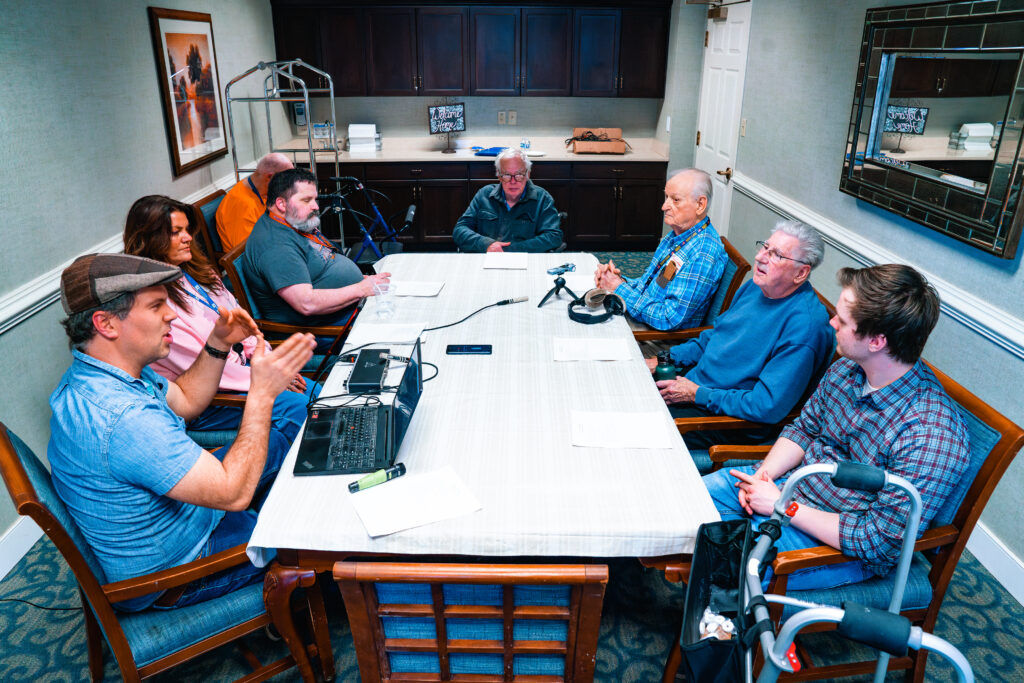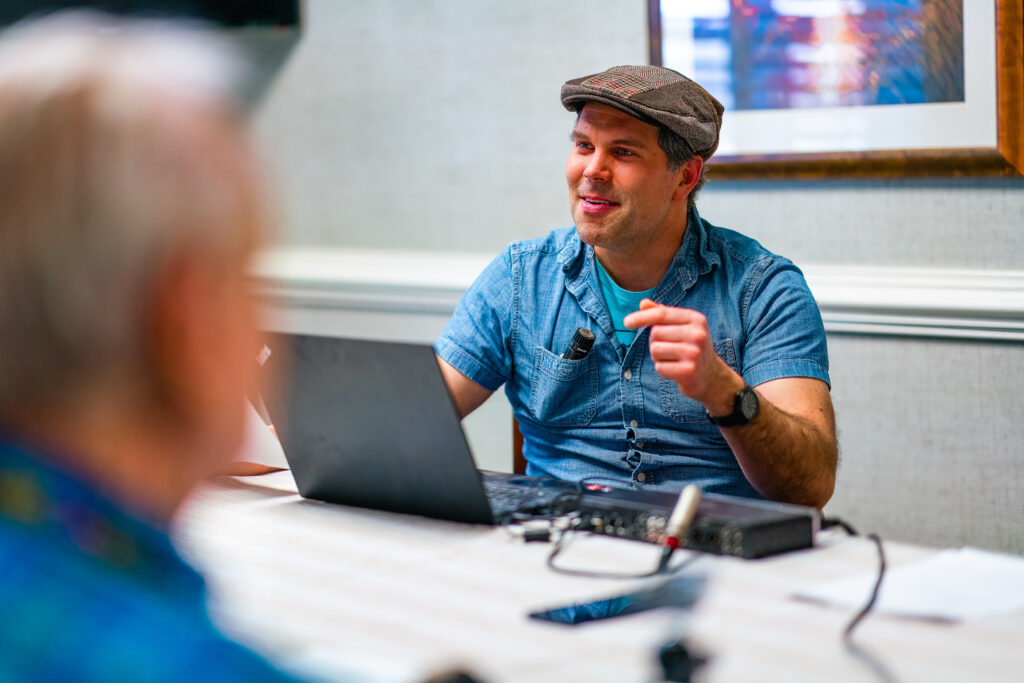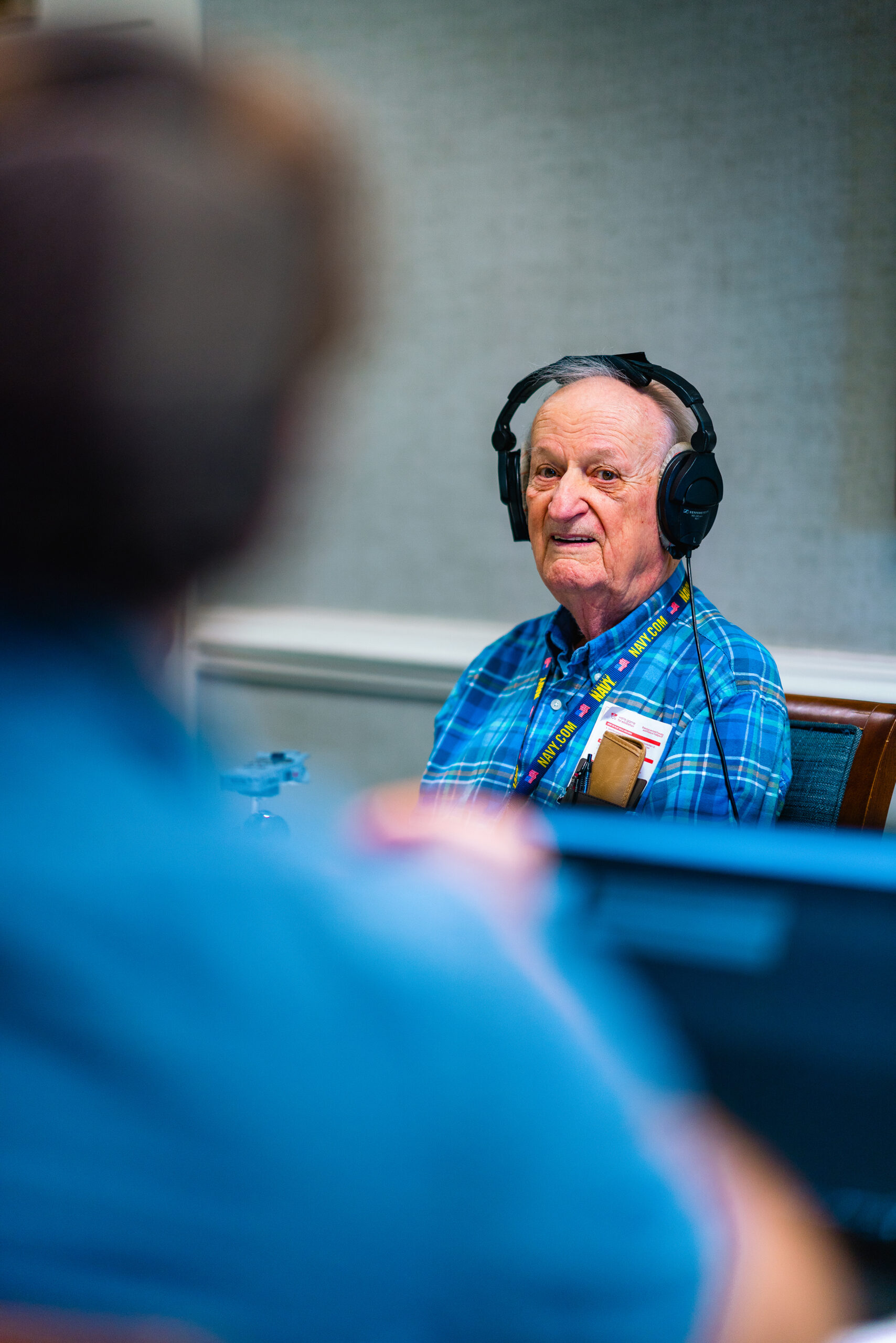Every week, Josh Urban motors around Virginia, bopping between 20 or so retirement communities from the hinterlands of the southwest, to the overstuffed stroads of NoVa, and the state capital’s strip-malled suburbs.
It’s unclear if there’s a name for what Urban does, and it’s less clear if it has a tax designation, but we’re going to call him a professional retirement community entertainer. He DJs with his robust vinyl collection, plays the Great American Songbook on one of his many, many guitars and hosts backyard stargazing with one of his many, many telescopes.
He calls himself a “storyteller.” In another time, though, he would have made a fine wandering bard.
“Instead of a crazy cat lady, I’m a crazy guitar guy and a crazy telescope guy,” Urban says. As of last summer at Morningside of Charlottesville, an assisted-living community with about 80 residents, Urban’s also a crazy retirement community podcast host guy.
“I work closely with Lisa [Duquette]. She’s the activities director over there,” Urban says. “She came to me one day and she’s like, ‘Look, you have any ideas? We have this men’s group going on and they’re all there, but what can we do with all these guys in this room?’ It was a cool opportunity.”
Urban, who’d dabbled in podcasting, suggested making a podcast. “One of the things that’s really interesting about this phase of life is all these guys are retired, right? So they’re not out there making stuff, but they’ve learned so much and it’s really hard for people to share what they learned, and we have some crazy stories in there, so I thought it would be a really neat way—and not only fun for the guys to do but also a really nice way for them to give back to the community and share what they’ve learned. … It’s a way to document front porch talk. ‘Hey! You remember that time?’”
The C’Dogs of Charlottesville launched in July 2024 and to date has 14 episodes, each about 45 minutes long and all recorded in a comfortable Morningside conference room where five to 10 men convene twice a month to tell stories and weigh in on world events. Food and military service are reliable topics. A recent episode veered into a banana shortage, and a holiday episode furthered the dialectic on whether Die Hard is a Christmas movie.
More serious topics are also addressed. One Navy vet witnessed a nuclear bomb test.
“He held up his arms and across over his face and he saw his bones,” says Duquette, the life-enrichment program director at Morningside, where she’s worked for three years. “And that man has conquered cancer of the larynx because of the inhalation. He’s 85 years old and he’s still here. These are stories that these men are not going to tell. They talk to each other, but to get these stories out—I feel like it’s just the purpose [the podcast is] serving.
“Recall at their age is so important, not just for the cognitive aspect but also the emotional. Keeping your mental health and bringing back those memories is a joy to a lot of them.”
Charismatic, lively eyed, and frequently wearing a stylish hat, the 39-year-old Urban acts as mastermind, emcee, and producer. He supplies the recording equipment and edits the episodes, posting them on SoundCloud at Soundcloud.com/the-cdogs. The podcast’s name is a riff on “seadogs,” a colloquial term for sailors and appropriate given the multiple Navy vets on the podcast.

“He kind of inspires the conversation and leads it in a good direction,” says John Trippel, a Morningside resident for the past year and a C’Dog. A graduate of America’s oldest art school, the Pennsylvania Academy of the Fine Arts, he is an oil painter—you can find his work at JohnJTeeee.blogspot.com—and a former teaching assistant with Albemarle County Public Schools.
“I think it’s great for the other guys in here who have a hard time talking in public,” Trippel says. “I think it’s really excellent that they have an opportunity to talk about their time in Vietnam, their time living a life of family, what they got into during their lifetimes.
“It’s a long period of time people here have, and a lot of events people have taken part in go unsung. They sit around—we have breakfast, lunch, and dinner in a dining hall but we don’t really talk about important events, family, moving, going through hurricanes. You know, difficulties in life that people found a way to get through that don’t really come up much in dining conversation. Guys are pretty quiet about themselves here. But with a formal event like a podcast there’s more time for people to expand on their experiences.”
A podcast recording starts off the air with an Urban-led, small-talk warmup. He asks questions unanswerable with “yeses” and “nos” to help everyone get chatty. He also doesn’t ask about favorite times, events, or things.
“I try to avoid stuff like that because one of the problems of getting older is they’re faced with a lot of these questions,” Urban says. “‘What’s your favorite memory?’ And they already feel like they’re checked out of society and that just makes it worse. So this is an idea of: No, your role in society now is you’re an elder. You have knowledge to share.”
Urban ended up with his bespoke career after offering to give guitar lessons at a retirement community about 10 years ago. The lessons weren’t that popular but his Frank Sinatra covers were. That expanded into giving music history lectures and eventually this podcast, each episode of which starts with a prompt. Urban says his first batch had stuff like, “Have you been skiing?”
“My list was kind of dumb,” he says, his voice subdued by self-awareness. “Good thing is we got to the second topic and it went off—boom!—on a tangent and people were talking about God, aliens, philosophy, and all this crazy stuff and we went over an hour.”
Now, Urban comes up with themes, often holidays. The episode editing, he says, is light. He plays the acoustic guitar intros and outros, and episodes are recorded in one take. If a podcaster wants something cut, it’s cut, but that doesn’t happen much. The option, though, helps the residents relax.
Urban’s goal is to keep the conversation moving. “The first maybe two or three episodes, people didn’t know what was happening,” he says. “I explained what a podcast was. Everyone’s sitting there. No one wants to say anything dumb—no one wants to say anything dumb on tape. We were working on getting things going. Sometimes a couple of guys would share stories. A couple of guys would just listen. Then we made a good move. Lisa had the idea of moving it so we’re all just sitting around a table and that seemed to really make a difference. Props are strange, you know? So we all sat around a table and then the idea of just, ‘Hey, we’re just sitting around having a conversation.’ This started happening after we got the hang of that.”
It seems the retirement community podcast is a novel thing, but the usual podcast apps—Spotify, Apple Music, etc.—offer a bunch of senior-centered shows. Duquette didn’t know of another assisted living community that had one, and Urban says none of the other communities on his circuit podcast.
Laurie Archbald-Pannone, a geriatric physician at UVA Health, says she hadn’t heard of such a podcast, either. Though she wishes she had—and that others existed.
“I thought it was fantastic,” says Archbald-Pannone, who’s also the medical director of Virginia Impact, a program created to help older adults with telehealth. “It really reflects one of the reasons I went into geriatric medicine to begin with, which is to get to know people—my patients. Get to know who they are now, the lives they’ve lived before, the lives they plan on living in the future.

and their own military service. Photo by Tristan Williams.
“I just think it’s so important in medicine, specifically that we don’t just know somebody’s blood pressure or kidney function, but that we really understand who they are and what’s important in their life, and this podcast, I think, is a great way to share that, not just with a medical team but with the community. I think it’s important as a community that we understand the treasures and resources we have through people’s lived experiences.”
Officially, this means the C’Dogs of Charlottesville are doing narrative medicine, a treatment philosophy that came about in recent decades.
Its origins are attributed to various physicians, often employed by Ivy League schools, with the modern iteration dating to the second half of the 20th century and the essence of it going all the way back to Hippocrates.
Now, Archbald-Pannone says, physicians are trained in narrative medicine, especially to treat elderly patients, who historically have been underrepresented in clinical studies for many reasons, but one of the biggest is that patients 65 and older tend to be lumped together. That means there are fewer specific treatment guidelines for them, particularly when it comes to prescription medication, even though that age group is responsible for about a third of all U.S. prescription drug use.
“A theme I sometimes hear from my patients, who are all older adults is, if they’re retired or they’re not functioning physically how they used to, they feel like, ‘Am I contributing to the community? What am I doing for my community?’” Archbald-Pannone says. “… Having a purpose, having a reason and contributing to the community, which is what this podcast does by people sharing their stories, really has lots of health benefits. It could basically combat social isolation.”
Urban says he’s not opposed to podcasting at other places, but for now he’s happy podcasting monogamously. Custom entertainment is a hallmark of his business model. He’s even learning to play the banjo because residents of a Roanoke retirement community asked to learn about Appalachian music.
“I tell people I’m their quirky neighbor stopping by with his rather extensive record collection,” Urban says. “We sit around and we listen to what they want to hear. We talk about things. We get curious about things. … There’s so many interesting things and there’s so much to be engaged with, and in a lot of these places, everybody’s watching TV all the time, so it’s nice to say, ‘Hey, have you considered this or have you considered that?’ And to watch people come alive, it’s really a cool thing.”





